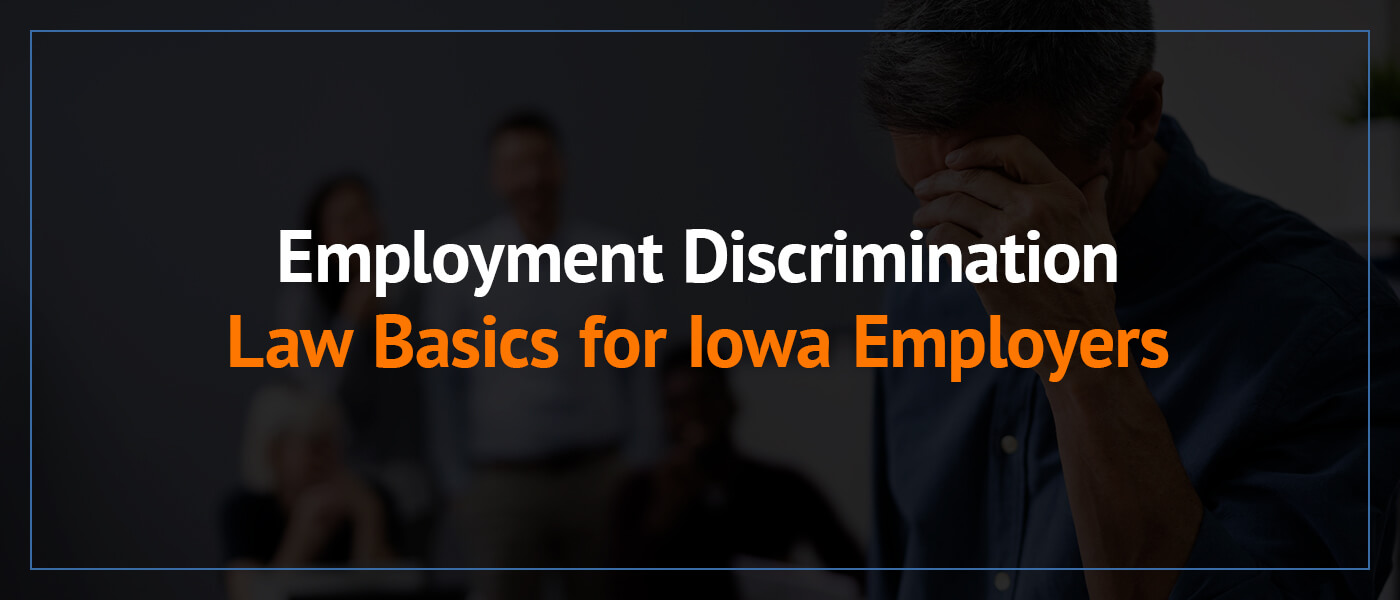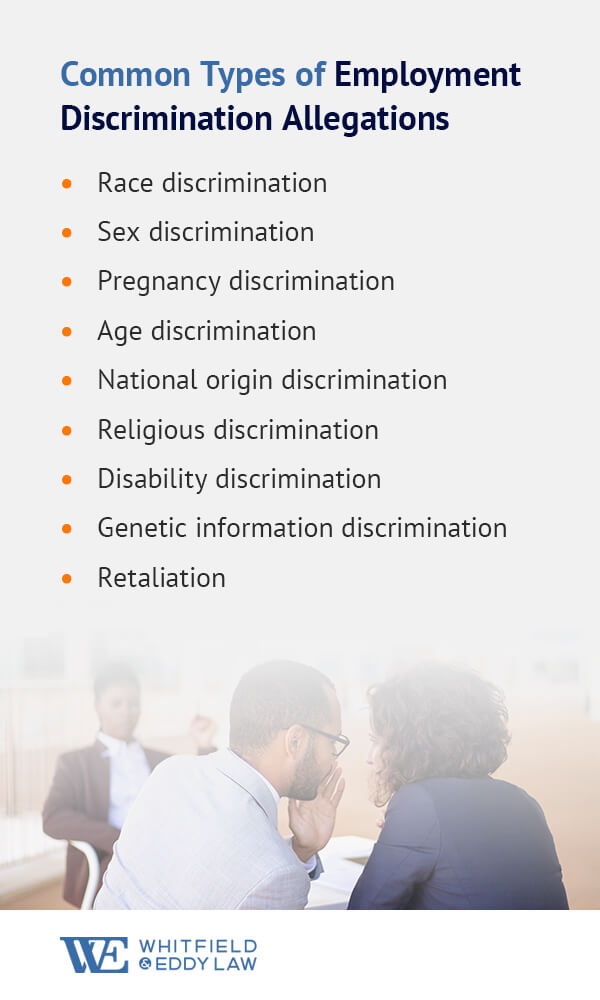Employment Discrimination—Legal Basics for Iowa Employers

Business owners and managers need to be aware of potential liability for employment discrimination claims and take steps to prohibit illegal actions and behaviors. Consult this guide to employment discrimination to learn more about how you can protect your business from employment discrimination claims and understand your employees' legal rights in the workplace.
Organizations should take care that all employees are treated in a fair and consistent manner. Employment discrimination claims frequently allege that the individual is a member of a protected class was treated differently (worse) from their peers, and the reason behind the different treatment was because of the protected class status. Protected groups are often categorized in different areas, such as:
- Age
- Race
- Skin color
- Disability
- Religion
- National origin
- Genetic information
- Sex, gender identity, sexual orientation, and/or pregnancy

For instance, if an employee repeatedly applies for a promotion but repeatedly is denied a promotion opportunity, that employee may file an employment discrimination claim against the employer. Among other things, the employer would need to have good documentation regarding the candidates’ qualifications, work history, and/or seniority to support the employer’s decision and show that it was not based on the employee’s protected class status.
Common Types of Employment Discrimination Allegations
The U.S. Equal Employment Opportunity Commission (EEOC) enforces laws prohibiting the various types of employment discrimination. A list of types of illegal discrimination is located on the EEOC website. Most employers prohibit these types of discrimination under the employer’s policies.
- Race discrimination: Race discrimination involves denying opportunities of equal employment to a person because of race or characteristics associated with a certain race, such as skin color, facial features, or hair texture.
- Sex discrimination: This type of discrimination occurs when an employee is denied opportunities for equal employment due to their sex. Sex discrimination can also involve treating an employee unfavorably because of a gender stereotype.
- Pregnancy discrimination: Pregnancy discrimination occurs when an employee or applicant is treated unfavorably due to pregnancy or childbirth. This type of discrimination can also occur because of a medical condition related to childbirth or pregnancy.
- Age discrimination: Age discrimination occurs when an employee or applicant is treated unfavorably due to his or her age. Federal protection mainly applies to workers who are at least 40 years old, though some states (including Iowa) offer protection from age discrimination to employees under age 40.
- National origin discrimination: This type of discrimination involves denying opportunities for equal employment to a person because they are from a different country or an accent or ethnicity.
- Religious discrimination: This type of discrimination occurs when an employee is denied equal employment opportunities because of their religious beliefs, or assumptions about the employee’s beliefs. Employers should generally make reasonable accommodations for employees' religious beliefs, practices, or observances, except in the case that doing so would result in undue hardship for the employer.
- Disability discrimination: This type of discrimination takes place when an applicant or employee is treated unfavorably due to his or her disability, including history or perception of a disability. Employers are required to provide reasonable accommodations to employees or applicants who have a disability, except in the case that doing so would result in undue hardship for the employer. The Americans with Disabilities Act (ADA) and Iowa Civil Rights Act (ICRA) both have protections for employees with disabilities.
- Genetic information discrimination: Genetic information discrimination occurs when an applicant or employee is treated unfavorably due to his or her genetic information. Genetic information refers to an individual's genetic tests, and sometimes, the medical history of the individual’s family. Generally speaking, an employer cannot use genetic information to make employment decisions.
- Retaliation: Retaliation involves an employer taking adverse action against an employee after the employee has assisted in an investigation of a discrimination complaint, complained about discrimination, or opposed a discriminatory employment practice.

What Laws Prohibit Discrimination in Employment?
Anti-discrimination laws at the federal and state level prohibit discrimination in employment. Laws that prohibit discrimination in employment include:
- The Age Discrimination in Employment Act: Age discrimination against those who are 40 or older is prohibited under the ADEA. Most complaints under the ADEA allege the employer preferred, or favored, younger workers.
- The Americans with Disabilities Act: The ADA protects employees with disabilities. Employees are also protected from discrimination based on their association with a person who has a disability. Under the law, employers should be prepared to provide reasonable accommodations to employees with disabilities.
- The Genetic Information Nondiscrimination Act: Title II of GINA protects applicants and employees from being discriminated against due to their genetic information.
- The Pregnancy Discrimination Act: Under the PDA, employees and applicants cannot be discriminated against based on pregnancy during any aspect of employment, such as hiring, pay, promotions, or firing.
- Title VII of the Civil Rights Act: This Act broadly prohibits employment discrimination. In Iowa, the Iowa Civil Rights Act (ICRA) also sets forth requirements for employers to follow.
- The Equal Pay Act: Under this Act, wage discrimination is prohibited between women and men who work for the same employer and perform equal work.
- Equal Employment Opportunity laws: Under EEO laws, applicants and employees cannot be punished for exercising their right to be free of employment discrimination or harassment.

What Are the Signs of Employment Discrimination That Employers Need to Be Aware of in the Workplace?
While the signs of discrimination in the workplace can sometimes be obvious, other times, the signs are more difficult to prove. The following are signs of discrimination in the workplace:
- Favoritism: If some employees are treated better than other employees, this could be a sign of employment discrimination. For instance, if certain people are given better parking spaces, offices, or job assignments, the supervisor may be giving them preferential treatment. There could be legitimate business reasons for preferential treatment, and employers should confirm adequate documentation and support is on file.
- Unequal pay: Generally speaking, employees have a right to discuss their salaries and wages. An employer that wants to require confidentiality should carefully analyze state and federal laws on this topic.
- References to age: If demeaning jokes or comments about age are made by co-workers or supervisors, this could be a sign of age discrimination. For example, a supervisor may make assumptions about the individual's level of technical knowledge because of their age.
- Inappropriate jokes: Employees may overhear inappropriate jokes or find themselves the subject of an inappropriate joke. This behavior is unacceptable, and they may file a formal complaint against someone who makes a distasteful joke about race, religion, gender, or other protected subject under the law.
- Denied or overlooked promotions: If an employee has been working hard and has the skills to successfully fill a higher role but is consistently passed over for a promotion, this may be an instance of employment discrimination. This is particularly significant if an employee applies for or express interest in a position, but someone who is less qualified is given the position instead.
- Suspicious or strange interview questions: If an applicant believes they are asked interview questions that are inappropriate or contain a stereotype, the employer may have issues with discrimination.
Contact Whitfield & Eddy Law
Employers trust Kay Oskvig for her ability to provide practical, effective, and carefully crafted solutions that address employers' complex legal challenges. With our knowledge and expertise, we can take a proactive approach to your workplace issues that may prevent a lawsuit. If you are already involved in a complaint, you should contact counsel as soon as possible for more information about your case and possible legal requirements.,
Kay strives to provide counsel that anticipates your needs so you can continue focusing on achieving your business goals. She will assess your situation and find options for resolution. Contact us at Whitfield & Eddy Law today to learn more about anti-discrimination laws or to discuss your organization’s approach to workplace issues.

